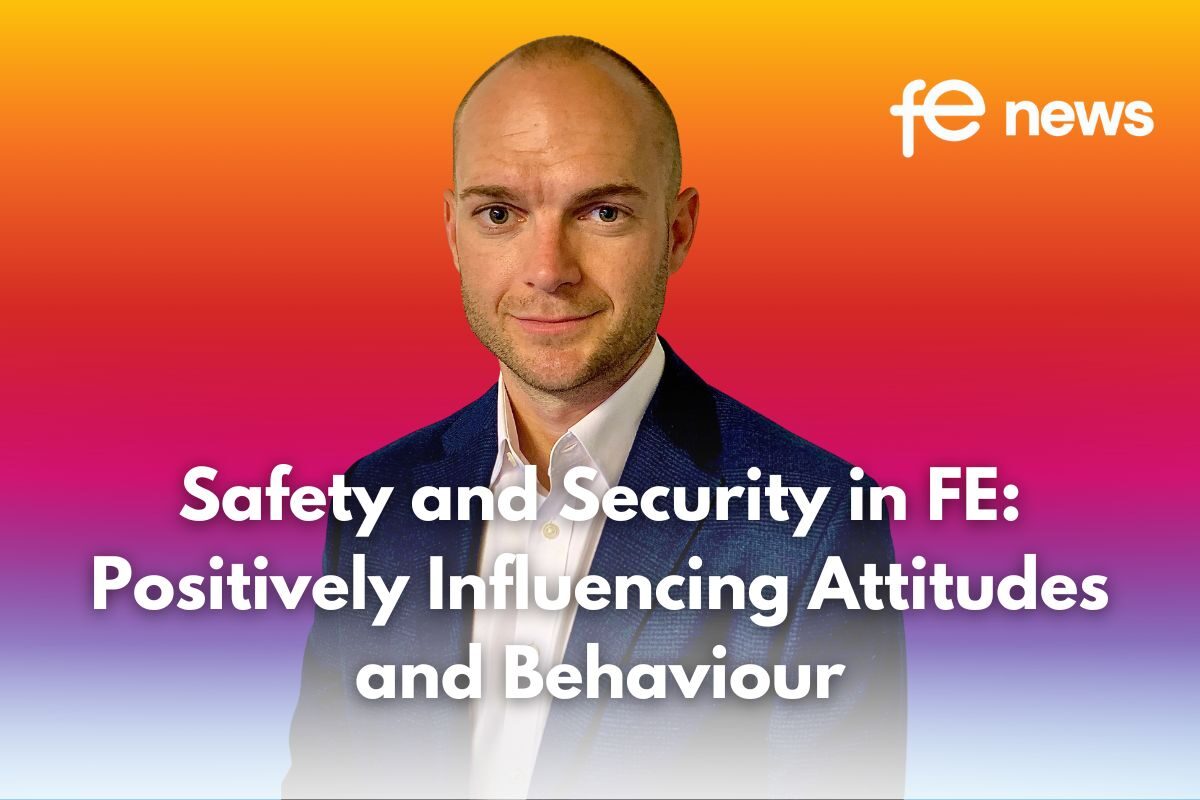Safety and Security in FE: Positively Influencing Attitudes and Behaviour

Learners in Further Education sometimes exhibit challenging attitudes and behaviours, the roots and causes of which are myriad and complex. So much has been written about this that you would think it was obvious and easy to fix, but it remains a near – intractable problem for many FE establishments.
One of the reasons for this is a lack of understanding of the relationship between campus security and safeguarding, the latter being ineffective without the former. Another is the wide disparity across FE providers in terms of training, commitment and implementation.
Despite the mandatory requirement for FE providers to have a Designated Safeguarding Lead (DSL), whose role is to provide support to staff to carry out their safeguarding duties, in October 2021 FE News reported that; “The guidance supporting the FE sector is not clear or consistent and the terminology used can be very much open to interpretation, which means that some learners may not always be supported in the most appropriate way for their needs or situation.”
In short, the approach to safeguarding varies enormously between organisations.
In this article, FE safety and security specialist Mark Thomson, managing director of Watchword, discusses the best approach to creating a positive environment for learning.
The fact is that it is not an intractable problem; it can be solved by focusing on and caring about what really matters, the welfare, wellbeing and safety of the young people in FE, starting with the security of your campus.
That sounds all warm and fuzzy, so here’s the hard reality behind it.
The applicable universal truth is that prevention is better than cure; in this case, reactive interventions, after an incident has occurred, must represent a failure somewhere in the system. Preventing the behaviour is the ultimate goal, and it is here that the safety warden can play a crucial role.
Security qualified, carefully selected and trained safety wardens promote positive behaviours on campus, by building relationships that over time influence attitudes.
Crucially, they also make learners feel safe, which means they perform better. Safety wardens practice active listening and conflict avoidance techniques and are trained in Mental Health Awareness, all designed to help build trust and respect.
In an influential report from 2018, ‘Managing Behaviour in Colleges’, the public service union UNISON offered advice for ‘establishing positive relationships with young people’; this included:
- Regardless of context, try to be positive and warm. Professional warmth goes a long way in disarming people’s fears and anxieties.
- Sincerity and reliability are key to building effective relationships based on trust.
It’s almost a blueprint for the creation of a positive, supportive environment; and it’s effectively a manifesto for the safeguarding ecosystem.
According to a 2023 article by CPD Online College: About Safeguarding in FE, “Everyone who comes into contact with children and their families has a role to play. In order to fulfil this responsibility effectively, all practitioners should make sure their approach is child centred. This means that they should consider, at all times, what is in the best interests of the child”.
Positive role models lead to better outcomes; blaming young people leads into a destructive cycle. As John Wooden, the great American baseball coach, said:
“Young people need models, not critics.”
This article argues that creating a positive culture on campus, based on trust and respect, goes a long way towards improving the lives of young people, and in turn goes a long way to reducing the burden on staff.
Safety In Numbers
The Office for National Statistics (ONS) says that between March 2018 and March 2020, students in England and Wales were on average over three times more likely to have experienced assault. In addition, the Health and Safety Executive (HSE) says that those who work in education are one of the groups most at risk from workplace violence.
In the Daily Express on March 22nd, the headline was about Keir Starmer wanting to put police on school gates, where young people are targeted, to cut knife crime.
In many FE campuses this is a rapidly increasing problem, but in campuses where safety wardens are properly integrated there has been a big increase in the number of confiscations, all coming from ‘tip offs’ from students who felt comfortable enough to talk to a trusted warden or the safeguarding team.
However, according to Culture Shift (November 2022) safeguarding isn’t a perfect science. “Things can be missed or overlooked. Our data showed that 72% of students had never disclosed details of harassment they had witnessed or experienced, showing a huge gap in the reality of what students are experiencing and what’s being discussed with staff.”
Culture Shift identifies several possible causes, including reliance on untrained staff and students hiding issues. “We found that this stemmed from the belief that they had reached a stage in life where they alone were responsible for resolving their issues; to speak up was to burden staff with problems that didn’t concern them. Another running issue was that of trust, with a number of students going as far as to say that they ‘don’t trust anyone’.”
They concluded by confirming a key point; “We see some organisations within the FE and skills sector taking a somewhat tokenistic response to safeguarding by just having a policy or designated officer (DSO) in place to tick a box.”
Penny Wycherley, former Principal and CEO of Highbury College, added;
“Right now, partly as a result of the continuing fallout from the pandemic and partly due to increased pressures as a result of the cost of living crisis, the burden on young people is as great as ever.”
Terms and Conditions
Many organisations are not prioritising security alongside safeguarding; in practice, they are closely linked – both promote the safety, wellbeing and security of students and staff – but strictly speaking there are clear definitions:
- Safeguarding is all about identifying and responding to potential risks, including child abuse, neglect, exploitation and bullying, to students’ wellbeing.
- Security involves measures to protect people as well the physical and digital environments of the learning establishment and ensuring that policies and procedures are in place to deliver this.
By working together, security and safeguarding teams can create a safe, supportive and stimulating environment for students and staff in which to learn and work. The two pillars of security and safeguarding are integral to the success of any education institution.
However, a phrase that is heard all too often from college staff is, “We don’t need security.” There is, in many organisations, a reluctance to consider, use or even say ‘security’ due to perceived connotations.
The reality is that security needs to be seen as part of your safeguarding strategy.
Maria Vetrone, Chief Operating Officer at City of Portsmouth College, said;
“Some senior leaders in FE colleges are unsure about using ‘security’, fearing it would send the wrong message; some say they simply don’t need it.”
“Having no security presence in what are very busy spaces with many young people is an oversight, but internal security teams are often plagued with issues; absence cover, professional knowledge and pressure on management capacity to name a few.”
Finally, according to NCFE: Safeguarding in FE – what more needs to be done?, “Due to the complex landscape within FE, the response to safeguarding is vastly different between organisations.”
Making A Difference
According to a survey by the Education and Training Foundation (March 2021): Survey of safeguarding staff in post-16 providers in England (funded by DfE) ;“Post-16 learners are presenting with a range of safeguarding concerns, of which the most cited were health, safety & welfare, mental health, bullying or harassment, self-neglect, risky personal behaviours and discrimination.”
It most often comes down to small, simple – you might say human – things, like when a learner arrives on campus and they walk straight through to their classroom without speaking to anyone; there is no influence on how they are feeling or how they then behave.
When a safety warden welcomes and engages with students, they can reach the classroom and they feel more positive. You’d be amazed how small interactions can have a huge impact.
This ‘human approach’ is supported by the UNISON report mentioned above, which concluded; “In college we might only interact with any one person for a short period of time and this can mean that we have a small window in which to convince someone to act one way rather than another.”
Safety wardens can play a hugely significant part in the lives of young people, influencing and supporting them every day; it just takes understanding and a deep passion for making things better.
By Mark Thomson – managing director, Watchword
About the Author
Mark Thomson worked in online education for two and a half years before joining the Army as an officer, spending seven years in the Royal Artillery – deploying to Afghanistan in 2013.
Mark left the Army in 2017 and started Watchword in 2018 whilst working as Director of Student Services for a University College in Reading.
Watchword become involved in providing security services for the Education sector after being asked for help, then they supported businesses with Covid testing resources; this led to a rapid growth phase for the company.
Demand for on – site Safety Warden (safeguarding) services was growing too, and Mark has focused on this aspect of the business as he is passionate about supporting learners and staff in the FE sector.
For more information, visit Watchword Home – Watchword (thewatchword.co.uk)











Responses